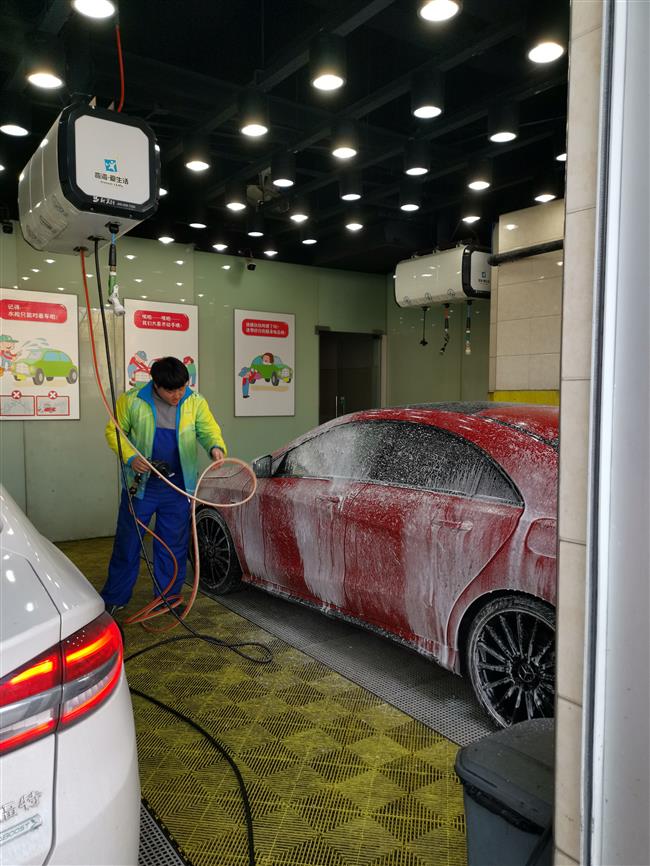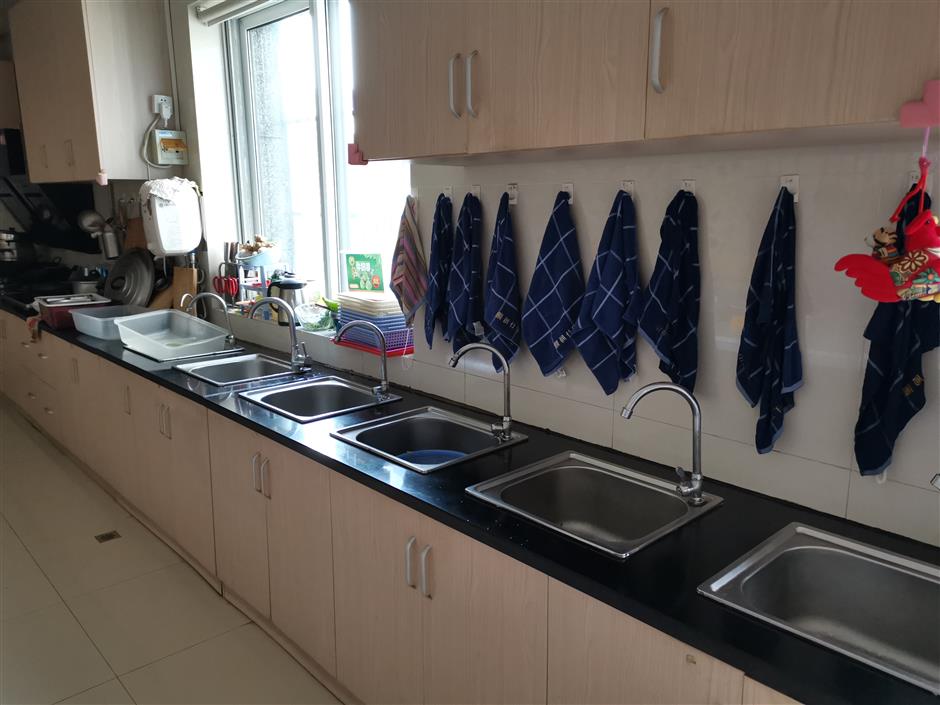Disabled youngsters win respect, dignity with hard work
When drivers pull into the Wanwan Car Wash on Kaixuan Road, they immediately discover something different — apart from two trainers, everyone has an intellectual or developmental disability, like Down syndrome, cerebral palsy or autism.
A girl with Down syndrome quickly brews tea when customers come in. The others wash a car together, each person taking charge of a different part of car. Trainers supervise and sometimes join in. Many drivers are frequent visitors. At first, they tried to pay extra because they tried to help these young people. However, they were turned down.
“These youngsters try to win respect from others by working hard. The car wash is built to help them integrate into society, not beg for sympathy,” said Xu Qin.

A Wanwan Car Wash employee cleans a car.
Xu, mother of a mentally handicapped boy, established Wanwan 10 years ago as a private rehabilitation and care home for intellectual disabilities. It has 30 handicapped young men and women today.
Wanwan has also opened a small grocery store. People with slight disabilities work in the car wash and the grocery, getting a salary every month. Those with serious mental disabilities take part in rehabilitation and training at the Wanwan care center.
“The salary is below the average level in Hangzhou, but it symbolizes respect and gives them happiness,” said Xu.
The care center is on the second floor of Jianggan District Disabled Persons’ Federation. The local government provides this free venue. In this center, young people learned washing car, selling products and serve customers.
“We used vehicle models to teach them to recognize cars, and different colors of towers to assign task,” Xu told Shanghai Daily. “Meanwhile, they have practiced in another car wash for a year.”
“Opening these stores is not blind. On the contrary, they fit for them according to different capabilities,” Xu added. “People who are sensitive to money are assigned to be cashiers.”
In the care center, a corner is designed as a living room. The young people have learned how to brew tea and serve visitors there. Seriously disabled people learn how to operate the television.
“The theme of the care center is better life. My ultimate goal for these young people is living on their own and integrating into society,” Xu told Shanghai Daily.
As for those with serious mental disabilities, their morning is centered on preparing lunch for others. It begins from buying ingredients at the wet market, and then washing, cooking and cleaning.

A 24-hour convenience store of Wanwan

Kitchen of Wanwan
The math class involves purchasing food; language is practiced in making the menu and mutual communication; physical rehabilitation is boosted in cleaning.
“Cooking food is also a kind of work. It is worth respect. Therefore, they are also paid,” said Xu.
Wanwan doesn’t charge a fee. With the rent and the cost of employing professional therapists, it hardly makes ends meet. Xu had spent her own money supporting its operation and development for the past 10 years.
“Wanwan won’t expand any more. I just hope it can provide other organizations with precious experience,” Xu said.
When Shanghai Daily visited Wanwan, we met a mother visiting from Taizhou whose son had an intellectual disability. She hoped Wanwan could take her son, but she was turned down.
“There are thousands of people with mental disabilities in Zhejiang Province. In Hangzhou, more than 30,000 people are registered as intellectually disabled. It is impossible for me to help all of them. All I can do is give my experience and tutor parents psychologically,” said Xu.
When it began, Wanwan had only seven teenagers. Xu rented a classroom and copied the rehabilitation methods of professional schools. However, she discovered that was not suitable for small group. Then, she moved to a residential community in a bid to teach the young people how to live on their own.
“Walking across the road, understanding traffic lights, buying products in supermarkets — everything was centered on daily life. However, the number of teenagers grew to 30. I had to move out and figured out a new development direction along with their growth,” Xu said. “Vocational training became our new plan. Therefore, I opened the grocery in 2015 and the car wash in 2016.”
Gradually, Wanwan achieved more and more fame in Hangzhou. The Jianggan District government and Alibaba Group offered help. The latter transformed the grocery into a 24-hour convenience store.
At night, half of the store is shut, while the other half is operated by machines. Customers pick their products on a digital screen and pay through Alipay, which helps add income.
The handicrafts made by these youngsters are also on the shelves for sale and available from Wanwan’s online shop on Taobao and WeChat.
On Xu’s mind, a healthy body is the foundation for rehabilitation. Wanwan has taken an active part in the Hangzhou International Marathon every year, though only running the 5-kilometer route. Its young people also have won prizes in citywide line dance and sports competitions for disabled people.
Wanwan also does its best to return favors to society. Every Laba Festival (the eighth day of the 12th month on lunar calendar) in Hangzhou, the prestigious Linying Temple dispatches Laba congee. Wanwan is one of the distribution spots.
“We are not alone. We have support from social groups, volunteers and official departments. I always believe God helps those who help themselves.
In the next 10 years, Wanwan will keep exploring new methods for its 30 young people and accompany them through life,” Xu said.
















